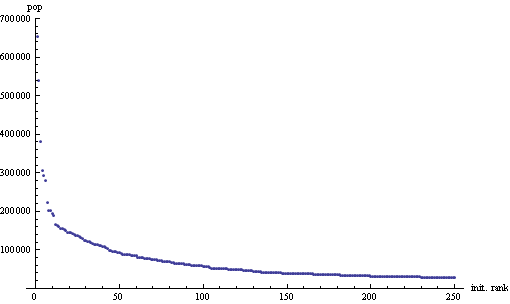Assume a population where everyone follows the British/American norm of taking their father's surname as their own.
That then gets passed on down the generations. When girl children with surname X marry, they take the boy's surname Y instead, and then so do all their children (boys or girls). And so on.
Maths question bit Given that some families will only have daughters, and some no children at all, does this naturally tend towards a position where, given enough time, everyone will end up with the same surname?
I was musing on this earlier putting Xmas cards in the bin, thinking that out of my Grandad and his brother, they had three sons between them (my Dad and my uncles), but between the three of them they had only two boys, of whom I was one (my other cousins on that side are all girls). And I've had two daughters, so it's only my brother (who is as yet childless) who is ever (potentially) going to pass our family surname into the "next" generation. If you follow me.
My ex-wife's family line went similarly - her Dad had no male siblings, he had two daughters, so now none of his grandchildren or great-nieces/nephews bear his surname.
This must happen to a lot of family names, I thought. So how long before we're all called the same?
That then gets passed on down the generations. When girl children with surname X marry, they take the boy's surname Y instead, and then so do all their children (boys or girls). And so on.
Maths question bit Given that some families will only have daughters, and some no children at all, does this naturally tend towards a position where, given enough time, everyone will end up with the same surname?
I was musing on this earlier putting Xmas cards in the bin, thinking that out of my Grandad and his brother, they had three sons between them (my Dad and my uncles), but between the three of them they had only two boys, of whom I was one (my other cousins on that side are all girls). And I've had two daughters, so it's only my brother (who is as yet childless) who is ever (potentially) going to pass our family surname into the "next" generation. If you follow me.
My ex-wife's family line went similarly - her Dad had no male siblings, he had two daughters, so now none of his grandchildren or great-nieces/nephews bear his surname.
This must happen to a lot of family names, I thought. So how long before we're all called the same?


Comment